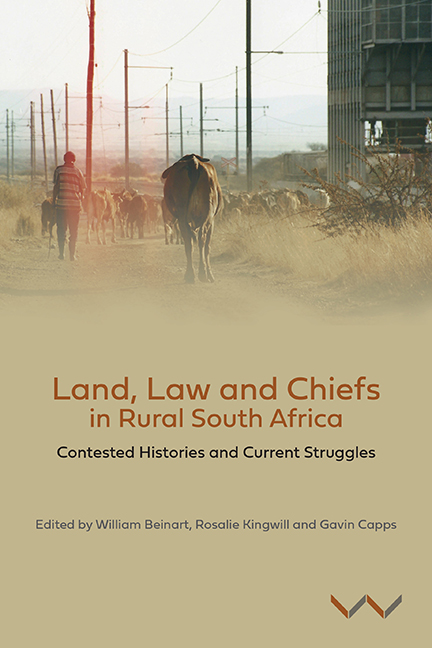Book contents
- Frontmatter
- Contents
- Maps
- Acronyms and Abbreviations
- Preface
- Introduction Land, Law and Chiefs: Contested Histories and Current Struggles
- Chapter 1 Constitutional Court Judgments, Customary Law and Democratisation in South Africa
- Chapter 2 Was ‘Living Customary Law’ There All Along?
- Chapter 3 When Custom Divides ‘Community’: Legal Battles over Platinum in North West Province
- Chapter 4 Chiefs, Mines and the State in the Platinum Belt: The Bapo-ba-Mogale Traditional Community and Lonmin
- Chapter 5 Mining, Graves and Dispossession in Mpumalanga
- Chapter 6 The Abuse of Interdicts by Traditional Leaders in South Africa
- Chapter 7 Resisting the Imposition of Ubukhosi: Contested Authority-Making in the Former Ciskei
- Chapter 8 Black Landlords, Their Tenants and the Native Administration Act of 1927
- Chapter 9 Customary Law and Landownership in the Eastern Cape
- Chapter 10 A History of Communal Property Associations in South Africa
- Chapter 11 ‘This is Business Land’: The Hlolweni Land Claim, 1983–2016
- Chapter 12 Restitution and Land Rights in the Eastern Cape: The Hlolweni, Mgungundlovu and Xolobeni Cases
- Contributors
- Index
Chapter 9 - Customary Law and Landownership in the Eastern Cape
Published online by Cambridge University Press: 15 June 2021
- Frontmatter
- Contents
- Maps
- Acronyms and Abbreviations
- Preface
- Introduction Land, Law and Chiefs: Contested Histories and Current Struggles
- Chapter 1 Constitutional Court Judgments, Customary Law and Democratisation in South Africa
- Chapter 2 Was ‘Living Customary Law’ There All Along?
- Chapter 3 When Custom Divides ‘Community’: Legal Battles over Platinum in North West Province
- Chapter 4 Chiefs, Mines and the State in the Platinum Belt: The Bapo-ba-Mogale Traditional Community and Lonmin
- Chapter 5 Mining, Graves and Dispossession in Mpumalanga
- Chapter 6 The Abuse of Interdicts by Traditional Leaders in South Africa
- Chapter 7 Resisting the Imposition of Ubukhosi: Contested Authority-Making in the Former Ciskei
- Chapter 8 Black Landlords, Their Tenants and the Native Administration Act of 1927
- Chapter 9 Customary Law and Landownership in the Eastern Cape
- Chapter 10 A History of Communal Property Associations in South Africa
- Chapter 11 ‘This is Business Land’: The Hlolweni Land Claim, 1983–2016
- Chapter 12 Restitution and Land Rights in the Eastern Cape: The Hlolweni, Mgungundlovu and Xolobeni Cases
- Contributors
- Index
Summary
In memorable terms, Tania Li (2010: 408) makes a fundamental point about land:
Land is solid. It is fixed in place. You cannot roll it up like a mat and take it away. It is invested with meanings, identities, and attachments, and it provides the basis for the muddy, grounded practices from which most of the world's population continues to derive an agrarian livelihood. Making it liquid, turning it into a fully-fledged commodity that flows without boundaries, is a giant step. Hence, it is not surprising that there are efforts to keep it solid, to stop the flow, and to insist on the fixity of land and – by extension – of the people attached to land.
Freehold title has been imbued with the idea of ‘ownership’ of land in Western civil and common law systems in the twentieth and twenty-first centuries. Title or ownership of land is the very epitome – symbolically and materially – of land with ‘liquid’ qualities as implied in the quote above. What happens when people resist the shift to liquidity that commodifies relationships to the land? What if other values inform holding land? What are these other values? Allowing landownership to flow without boundaries shifts the subject-object relationship of people-to-land from people belonging to land to land belonging to people (Peters 1998: 360). Land that belongs to people can be disposed of; at least that is the rationale if not the obligation.
In this chapter I look at the interface between these states of ‘solid’ and ‘liquid’ by analysing evidence of local customary practices that come into play in two case studies in the Eastern Cape. In both cases land is held in freehold title that is effectively maintained as patrimonial property in families. Despite the legal conversion to title that should in theory encourage individualisation and alienability, the land is in most cases regarded as a family entitlement that is inalienable. These two states of allowing or obstructing ‘the flow’ of land are usually constructed as a binary, with individual and communal or collective tenure opposed to each another. Closer examination reveals a more complex picture, with implications for the interpretation of customary law, and in particular, ‘living customary law’. Oversimplification tends to depict the two states as a choice between two routes with clear consequences.
- Type
- Chapter
- Information
- Land, Law and Chiefs in Rural South AfricaContested histories and current struggles, pp. 186 - 207Publisher: Wits University PressPrint publication year: 2021

